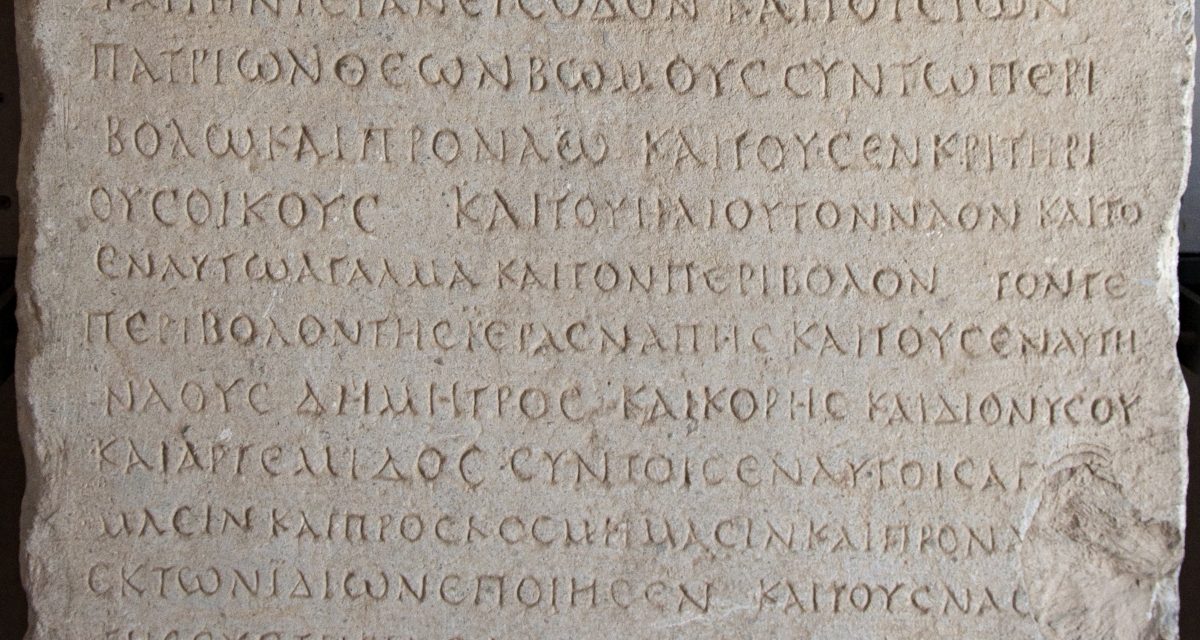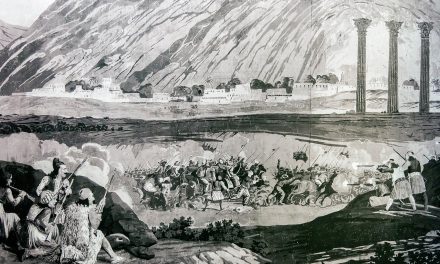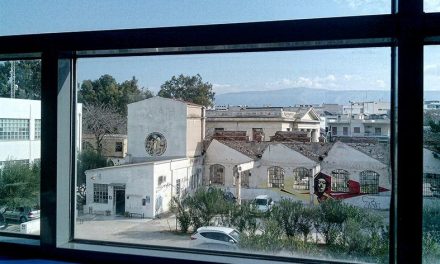Arguably most people realize that words such as democracy, philosophy or tragedy come from Greek, since the very concepts which they represent also have their roots in Greece. And you might also suspect the Greek origins behind some strange and obscure words such as anathema, synecdoche or onomatopoeia, as well as long and hard-to-pronounce medical or scientific terms terms such as otorhinolaryngology or trichotillomania.
Yet it might surprise you to find out that a number of words used in everyday conversation –from period and government to box or purse– actually derive from Greek!
Below we will list some of these words and provide their etymology: many among them –perhaps the majority– have come to English through Latin, some have come through French and others directly through Ancient Greek. Finally, many have been coined by English (or other non-Greek) speakers using Greek words to label new concepts and name new objects.
Some of these words do come from a particular background, such as medicine, science or political theory; they are however often used by English speakers without any special knowledge of these fields or particular familiarity with their terminology.
It should also be noted that, although these words have come into other languages from Ancient Greek (Classic, Hellenistic and, rarely, Medieval), they are, almost in their entirety, still used in contemporary Greek, either in their original form or with slight alterations, bearing the same or similar meanings; even those coined by foreign speakers have been reborrowed as semantic loans.
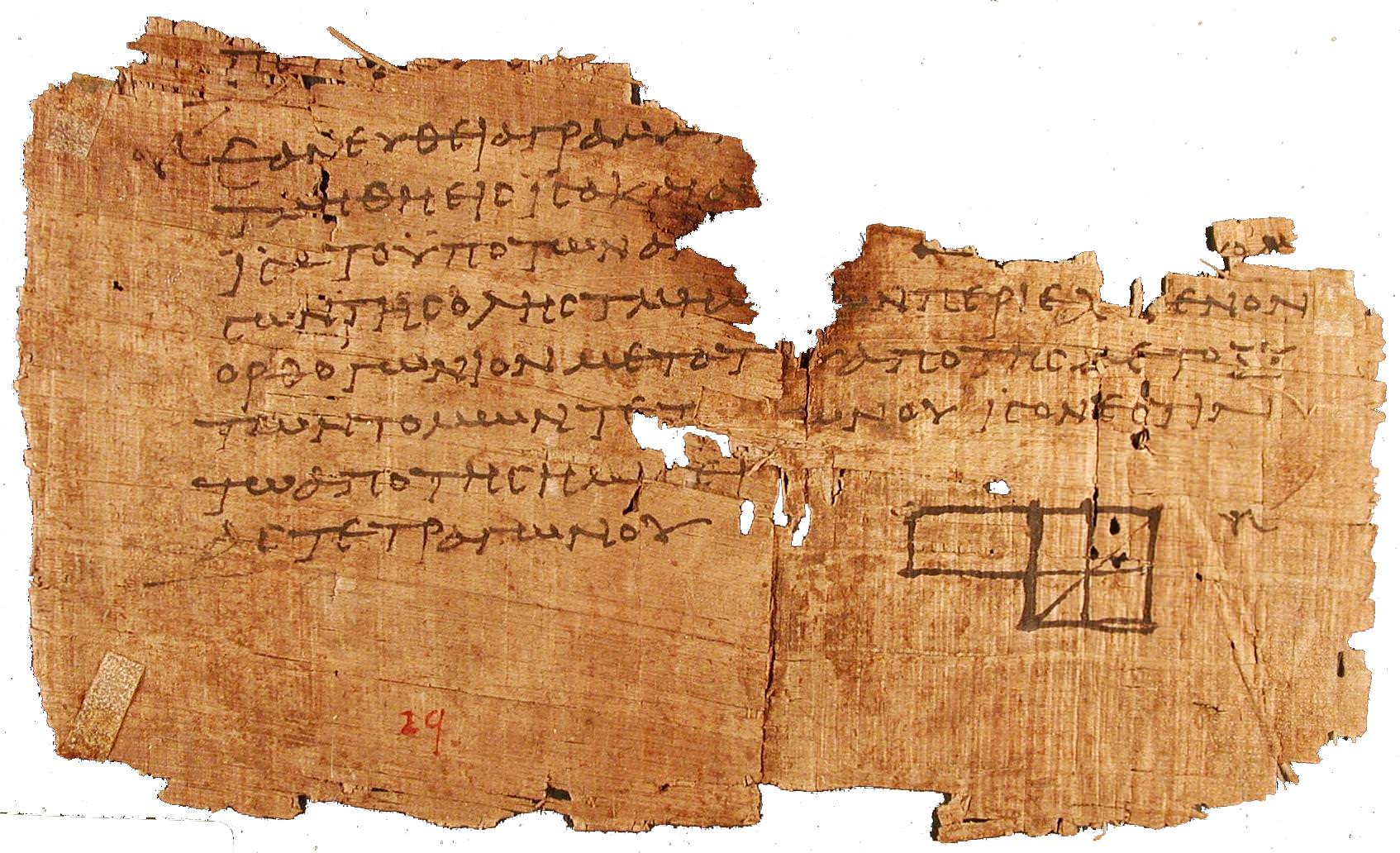 A fragment of the second book of the Elements of Euclid in Greek, discovered in 1897 at Oxyrhynchus, Egypt
A fragment of the second book of the Elements of Euclid in Greek, discovered in 1897 at Oxyrhynchus, Egypt
Time, space & measurements
There are several words originating from Greek to describe a time period (periodos from prefix peri– “around” + hodos “way”): from hour (hora) and phase (phasis “appearance”) to epoch (epoché “the place of a star and hence a specific instant in time”, from epi “on” + echo “to have, hold”), and from decade (from dekas [genitive dekados] “a group of ten”) to eon (aion “age, eternity; century”). Chronology as well as chronicle derives from chronos “time”, while cycle comes from kyklos “circle”; parallel (parallelos) comes from para “beside” + allelon “of one another” (from allos “other”).
The word place derives, through French and Latin, from plateía [hodos], “broad [way]”, which came to mean an open space (and is now the Modern Greek noun for a public square). As far as shapes go, hexagon comes from hex “six” + gonia “corner, angle”, ellipse from elleipsis (from elleipo “to ommit”) and circle from krikos “ring” (as mentioned in the first installment), while the latter’s diameter (diametros) and its perimeter (perimetros) come, respectively, from dia “across” and peri “around” + metron “measure”.
Meter (and metric) also derives from metron, as does symmetry (from syn “with, together”), while diagram (diagramma) combines dia with gramma “letter, writing” (where grammar also derives from, as mentioned in the previous installment) and periphery comes from peri + phero “to bear, carry”. Gram also comes from gramma, and liter from litra, an ancient coin and measure of weight. The first part of hectare comes from hekaton “one hundred”. Finally, cube comes from its Greek equivalent, kyvos.
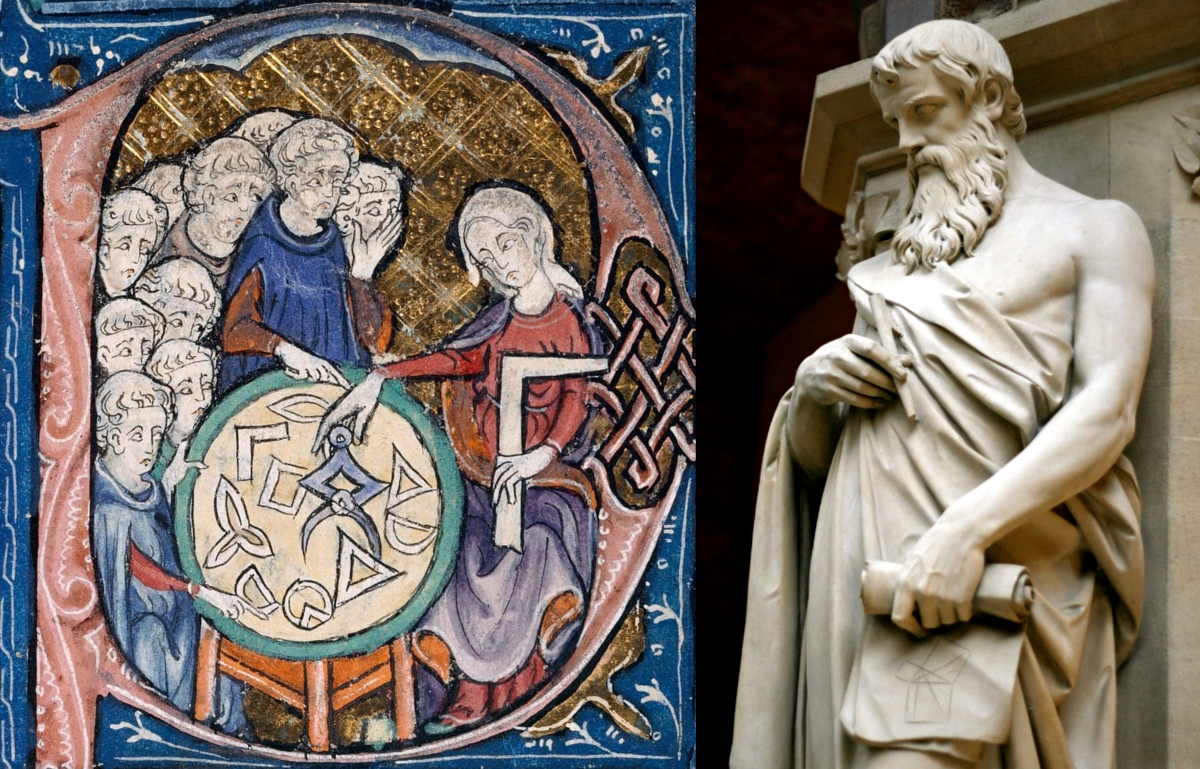 Left: An illumination from a manuscript based on Adelard of Bath’s translation of Euclid’s Elements, c. 1309–1316; right: Statue of Euclid at the Oxford University Museum of Natural History (by Mark A. Wilson via Wikimedia Commons)
Left: An illumination from a manuscript based on Adelard of Bath’s translation of Euclid’s Elements, c. 1309–1316; right: Statue of Euclid at the Oxford University Museum of Natural History (by Mark A. Wilson via Wikimedia Commons)
Everyday objects
Some of the words in this section will surprise not only foreigners but also most Greeks – starting with the (definitely not “Greek-sounding”) box which, nevertheless, derives either from the Latin buxus “box tree; thing made from boxwood” from the Greek pyxos “box tree; boxwood” or from the Late Latin buxis “box”, from the Latin pyxis “small box for medicines or toiletries”, itself from Greek pyxís “box or tablet made of boxwood” (again from pyxos “box tree; boxwood”). It is worth mentioning that pyxís (pyxída in Modern Greek) is the Greek word for “compass”.
Almost every word in this section (as in most sections, after all) has come to English through (various forms of) Latin, while many have additionally passed through other languages, such as Old French and/or Middle English, and as a result they sound very different from the original Greek. One characteristic example is the word chair, from Old French chaiere / chaere, from Latin cathedra “seat”, from Greek kathedra, from kata “down” + hedra “seat”.
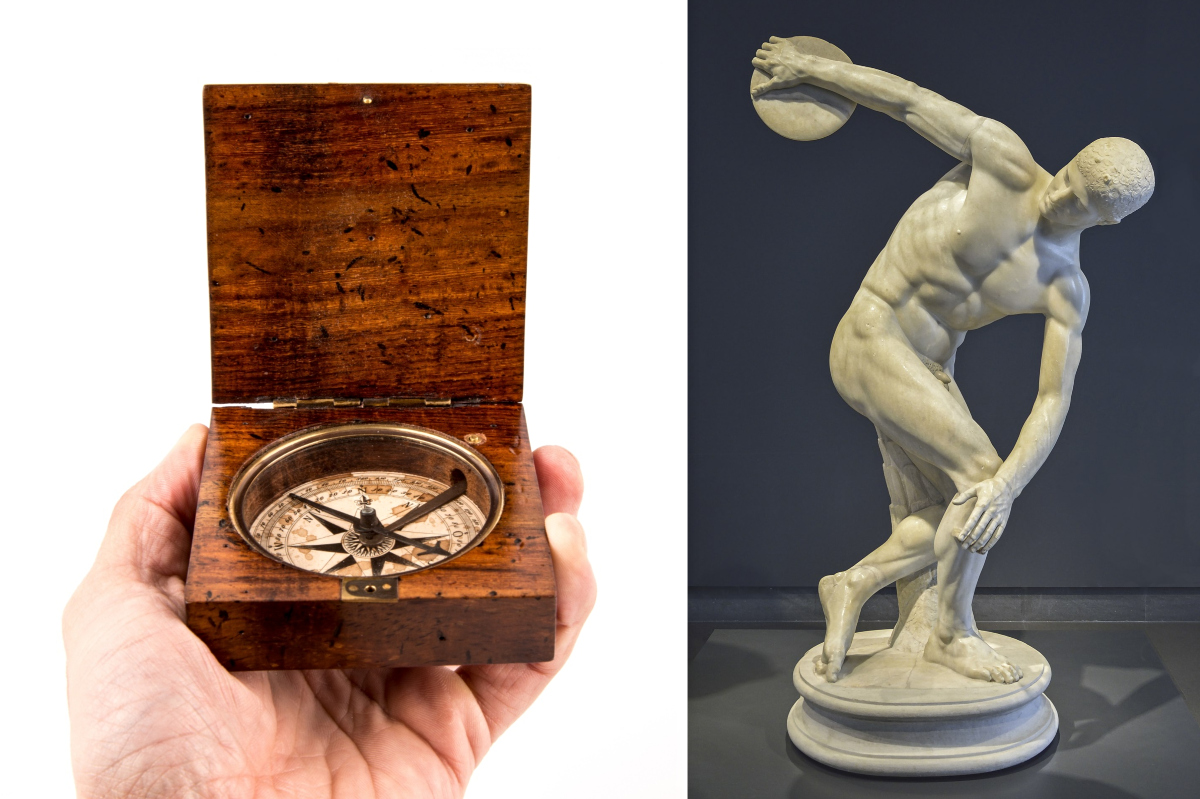 Left: old compass in a wooden box; right: Discobolus in National Roman Museum Palazzo Massimo alle Terme (by Livioandronico2013 via Wikimedia Commons)
Left: old compass in a wooden box; right: Discobolus in National Roman Museum Palazzo Massimo alle Terme (by Livioandronico2013 via Wikimedia Commons)
This has also resulted in a single Greek word sometimes being the root of two or more (seemingly unconnected) words in the same language, called doublets. One such case is diskos (also mentioned in the previous installment) which means a flat, circular object. This word passed into Latin as discus, taking the same sense but also, later, that of plate, round table and raised platform. Hence the English words disk (and disc), but also dish, desk and dais – and of course discus (in sports).
It is worth mentioning that the original word is still used unaltered in Modern Greek, with the meanings of disk, discus, (serving) platter, (serving) tray, alms dish, vinyl record (and music album) and intervertebral disc.
Surprised with dish? Plate comes from platys “broad, flat” –where platinum probably also derives from (as does place, mentioned above)– while crystal derives from krystallos “clear ice; mineral”. Metal comes from metallon “quarry, metal”, while carton and card (but also chart and cartoon) all ultimately derive from chartes “paper” (paper itself deriving from papyrus, as mentioned in the previous installment). Cane comes from kanna “reed”, sponge from spongos, and sandal from sandalon, while both chamber and camera come from kamara “vault, vaulted structure”.
Coffer comes from kophinos “basket”, as does coffin, and purse (but also bourse) from vyrsa “hide, leather”. What’s in a purse? Possibly cosmetics (adj. kosmetikos from kosmeo “to arrange, adorn”, from kosmos “order; ornament; world”; maybe chewing gum (from kommi “gum”, of Egyptian root – note however that the gums of our teeth have an unrelated Germanic root). And perhaps some nickels: an abbreviation of the German Kupfernickel, a mineral containing copper (from Kypros, the island of Cyprus) and Nickel (the name given to some sprites in German), a diminutive of Nikolaus (from the Greek name Nikolaos).
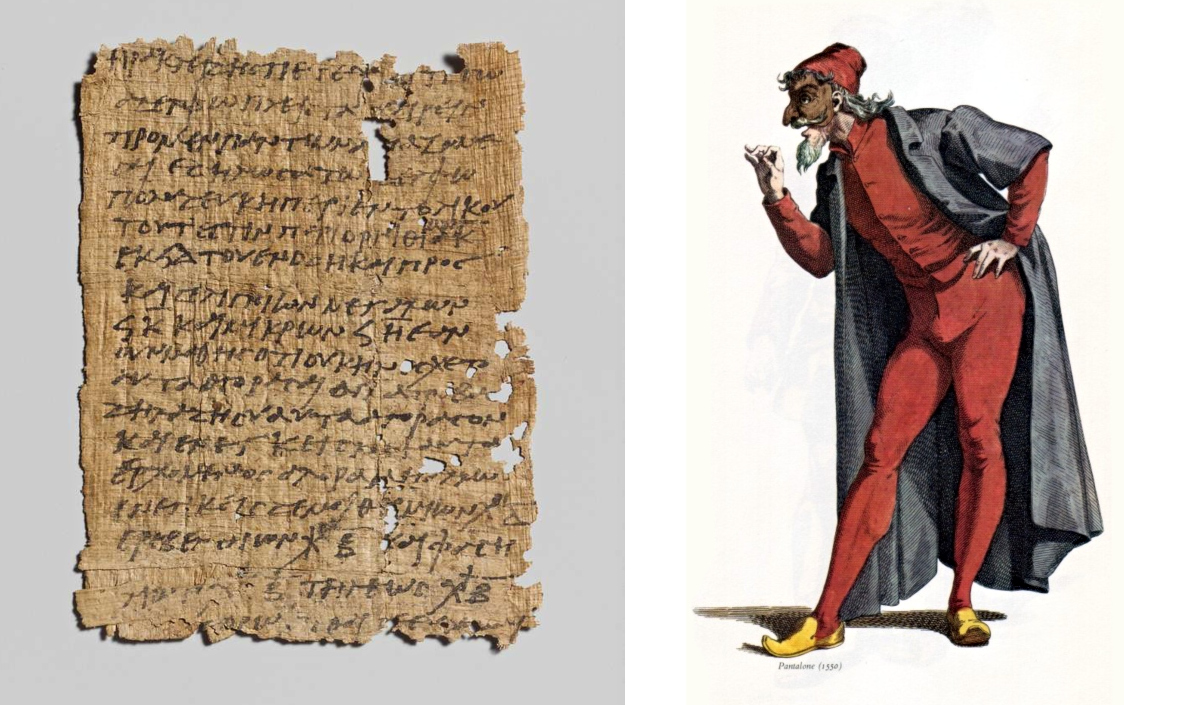 Left: Papyrus; right: Pantalone by Maurice Sand
Left: Papyrus; right: Pantalone by Maurice Sand
Another word for a common object ultimately deriving from a Greek first name is pants: short for pantaloons, trousers worn by Pantalone, a Commedia dell’Arte character (such as Harlequin) who was a caricature of Venetians named after a saint popular in Venice, the Bithynian Saint Pantaleon (from pan “every” + leon “lion”). Pantaleon was the saint’s name at birth, although he later changed it to Panteleemon “all-compassionate” (as he is known in Greek) at his Christian baptism.
The word gas was coined by the early 17th-century Flemish chemist Jan Baptist van Helmont, inspired by the Greek chaos in the sense of “void, empty space” (g in Dutch is pronounced like the Greek ch). It should be noted that this applies to substances like natural gas, carbon dioxide, etc., and gas as a state of matter in general. Gasoline, however (which is often shortened to “gas”), is probably named after the man who first marketed it, John Cassell, even though its final form was probably influenced by gas and also by oil. Petroleum (and petrol), on the other hand, takes its name from the words petra “rock” and the Latin oleum from elaion “olive oil” (where oil also comes form), while octane derives from okto “eight”.
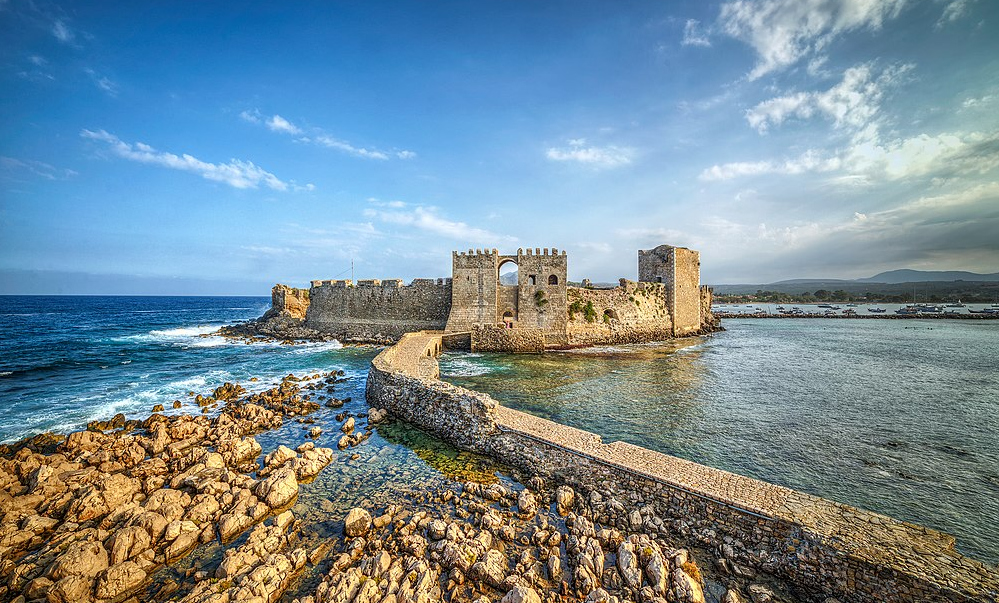 Methoni castle as seen from Bourtzi (by Spiros Paraskevopoulos via Wikimedia Commons)
Methoni castle as seen from Bourtzi (by Spiros Paraskevopoulos via Wikimedia Commons)
Tourism
Even Greeks are usually unaware of the fact that tour as well as the verb turn ultimately come from the Greek tornos “turning-lathe”. Tourism might help you come into contact with the ethos “character” and psyche “soul” of different peoples and ethnic (ethnikos “belonging to a nation; heathen”) groups.
You might prefer to visit places with a long history (see previous installment), full of archaeological (archaios “ancient” + logos“speech”) sites and treasures (from thesaurós, where the thesaurus dictionary also takes its name), marble (from marmaron) temples or medieval towers (from tyrris, of the same sense) and meandering (from the river Maeander [Maiandros] in Asia Minor) cobblestone streets; or you may better enjoy the modern architecture (architekton “architect“, literally chief builder) of a hectic (from hektikos, “habitual, hectic”, from the verb echo “to have”) metropolis (meter “mother” + polis “city”), and wish to lose yourself in its asphalt (asphaltos, literally “uncollapsible”) labyrinth (lavyrinthos “maze”) and frenetic (from phrenitis “delirium, frenzy“, from phren “mind”) rhythms (rhythmos).
Politics and society
Unlike medicine, the realm of law, state and society is where we encounter words originating predominantly from Latin; however, we still encounter a number of Greek words, even if many have come into English through Latin (which is, after all, the case for most Greek words in foreign languages). Besides, Greece –and, more particularly, Athens– was the first place to introduce democracy (demokratía, from demos “people” + kratos “power, rule”) as a form of government, while Plato’s Republic (Politeia) is considered the first example of political theory.
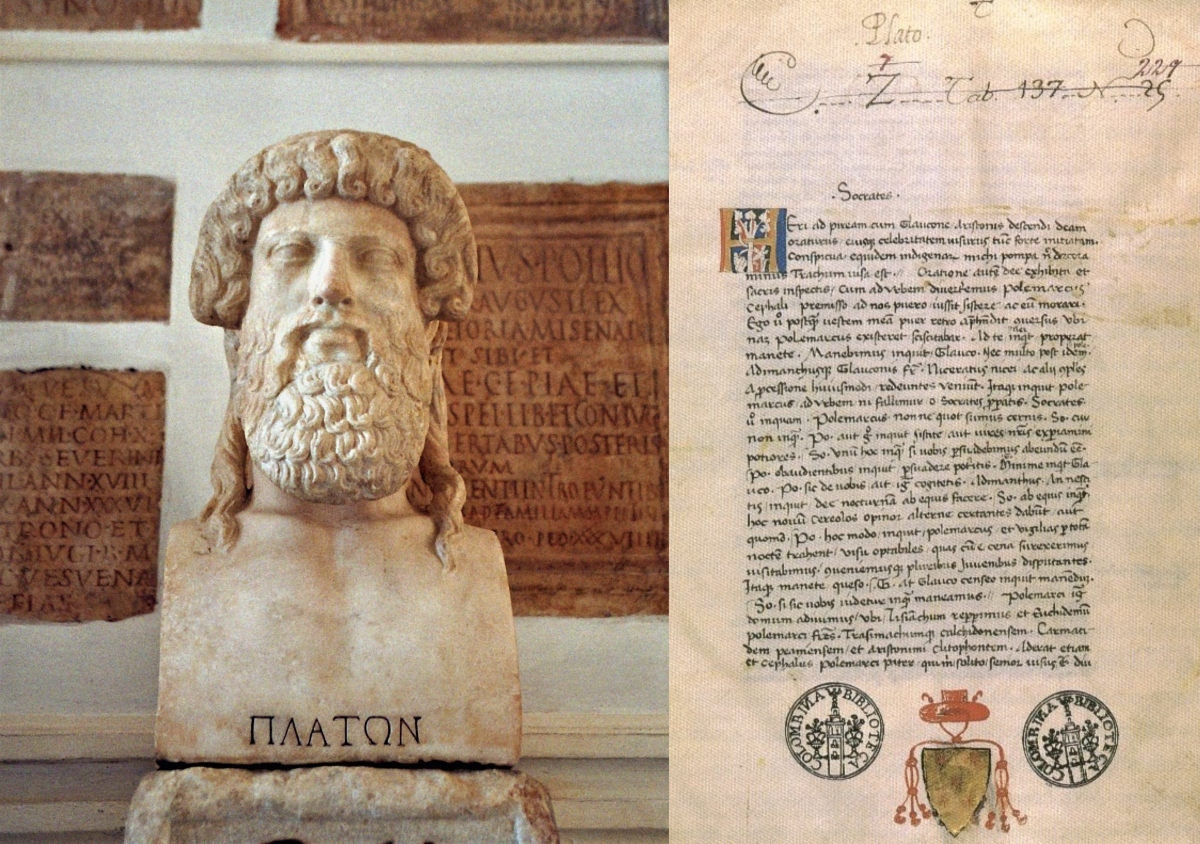 Left: Bust of Plato, Musei Capitolini, Rome; right: Renaissance manuscript with Latin translation of Plato’s Republic
Left: Bust of Plato, Musei Capitolini, Rome; right: Renaissance manuscript with Latin translation of Plato’s Republic
The verb “govern“, for example, comes from the Latin guberno “to steer, pilot; govern”, deriving from kyvernó, which has the same meaning in Greek, while system comes from systema, from the verb synistemi “to combine, organize” (syn “with, together + histemi “to stand”). The word politics itself comes from the adjective politikos “civic”, from polites “citizen”, a derivative of polis “city”. Another derivative of polites is politeia “state, administration”; polity, which has the same meaning, derives from this word, as do the words “policy” but also “police“.
Various forms of government have been developed throughout history, usually being rather autocratic (autokrates “sovereign, absolute”, from auto “self” + kratos “power”), as it was generally believed that masses (maza “lump of dough” from the verb masso “to knead”) had to be controlled by a despot (despotes “lord, master”), who would take drastic (drastikós, “active, efficient”) measures and establish a clear hierarchy (hierarchía, from hieros “holy” + archo “to rule”), or else anarchy (a– is equivalent to un-) and chaos (“void”) would ensue.
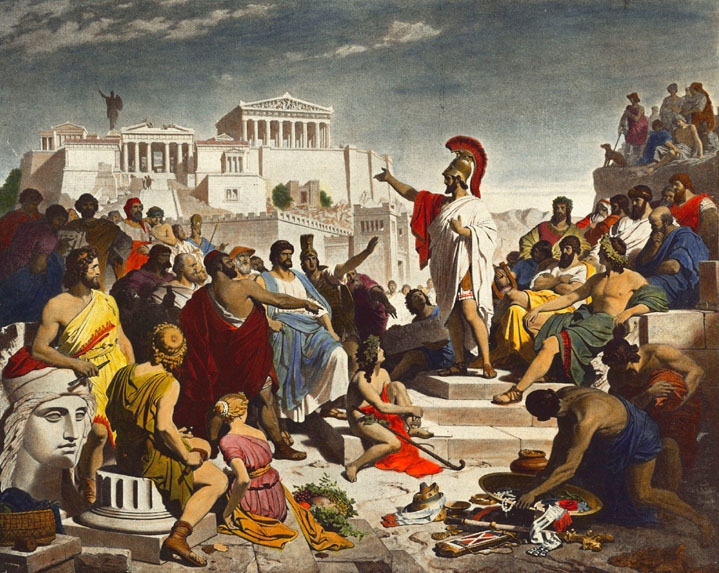 Pericles’ Funeral Oration, c.1877, Philipp Foltz
Pericles’ Funeral Oration, c.1877, Philipp Foltz
The most common regime used to be that of absolute monarchy (monos “alone, only” + archo) where a ruler inherits the throne (thronos “seat”) by birthright, as a member of a dynasty (from dynastes “ruler”, from dynamai “be able”), and the unbounded power of the crown (from korone “type of sea-bird; sth curved; a type of crown”) did not differ from that of a tyrant (tyrannos “absolute ruler”). However, more power was progressively given to the parliament (from the French word parler “to talk” which derives through Latin from the Greek paravallo “to compare” – where the word parable also comes from (as mentioned in the previous installment).
Today, the state still has the monopoly (monos + poleo “to sell”) of violence, but it is required to use it ethically (from ethikos “moral”) and with respect towards the citizen’s rights and autonomy (auto + nomos “law”). There is a strict protocol (from the Byzantine protokollon “first sheet glued onto a manuscript”, from protos “first” + kolla “glue”) controlling the acts of the heads of state; the economy (oikonomía “household management”, from oikos “house” + nemo “to distribute, allocate”) is not supposed to serve the interests of the aristocracy (aristos “best, high-born”+ kratos), the plutocrats (ploutos “wealth”) or the oligarchs (oligoi “few” + archo), and the rights of the workers are promoted by syndicates (from syndikos “advocate for a defendant”, from syn “beside; with” + dike “judgment; justice”).
The leaders of each political party announce their program (programma “edict” from prographo “to set forth as a public notice”) according to their ideology (idea “notion” + logos “speech”) and their positions on a number of topics (topikos, from topos “place”), which they can further analyze (analyo “to release, ressolve”, from ana “up, throughout”+ lyo “to unfasten, loosen”) speaking to the media.
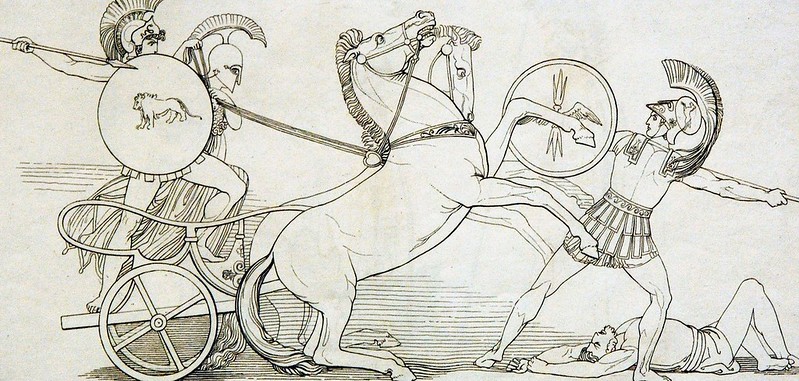 Diomedes and Athena attacking Ares (by Dr. Yasas Bandara via Wikimedia Commons)
Diomedes and Athena attacking Ares (by Dr. Yasas Bandara via Wikimedia Commons)
Crisis and war
Sometimes diplomats (from diploma, literally “folded paper”, from diploo “to fold”) cannot bridge the chasm (chasma “cleft”) in the relations between countries, perhaps created by patriotic (from patris “fatherland”) fervor or from seeing the world though a different prism (prisma “something sawn”). A severe crisis (“decision, judgement”, from krino “to judge”) ensues, and these cataclysmic (from kataklysmos “deluge”) events may spiral (from speíra “wreath, coil”) into war.
The heads of the army then set a strategy (from strategos “army commander, general”, from stratos “army” + ago “to lead, conduct”) hoping that their schemes (schema “form, shape”) and tactics (adjective taktikos, from tasso “to arrange, to order”) will ensure their triumph (thriamvos “hymn to Dionysus, sung in processions” and, by extension, the “procession”). War used to be fought with catapults (katapeltes, from kata “down; against” + pallo “to sway; hurl”) and later cannons (from kanna “reed” – where cane also comes from), while now bombs (from vomvos “humming, buzzing sound”) are mostly used.
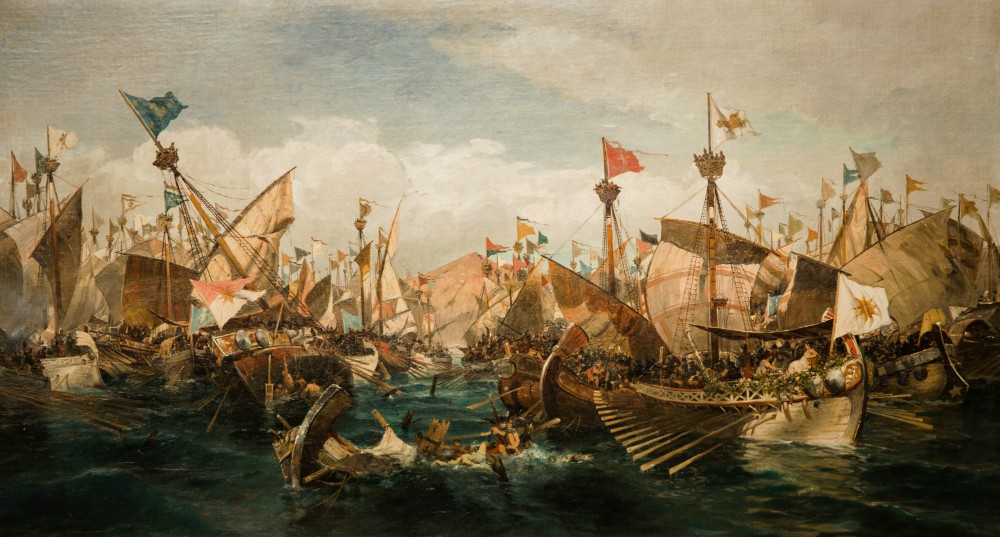 Naval Battle of Salamis, 1882, Konstantinos Volanakis, Hellenic Maritime Museum
Naval Battle of Salamis, 1882, Konstantinos Volanakis, Hellenic Maritime Museum
Eventually, victors and losers alike suffer the catastrophic (catastrophe from katastrepho “overturn; destruct”) results of conflict, which ends in natural disaster (from astron “star”) and leaves people frantic (from frenetic, ultimately from phren “mind”), in panic (panikos “pertaining to the Greek god Pan”) and in agony (agonía “struggle, anguish” from agon “constest”). Many will become refugees, seeking asylum (asylon “sancturay”, from a– “un” + syle “seizure, plunder”) abroad. When war finally ends, governments are faced with the dilemma (from di– “two” + lemma “premise, proposition”) of going after defectors or granting a general amnesty (amnestía), literally “forgetfulness”.
Note that one of the world’s most famous defense headquarters, the Pentagon, is named after a shape with a Greek name (pente “five” + gonia “angle”), while one of recent history’s greatest tragedies, the Holocaust, is named after holocaust “burnt offering”, from holokautos“wholy burnt”, from holos “whole” + kaio “to burn”.
In “Common words you (probably) didn’t know were Greek – Part 1“: words about human character, animals, biology, geography and planets
In “Part 2“: words from the fields of music and theater, speech and writing, and education and sports
In “Part 4“: words from the fields of religion & the supernatural, science & technology, and several miscellaneous entries
Also discover: Greek words about health and medicine in English
Read also via Greek News Agenda: USA city names of Greek origin – Part 1; USA city names of Greek origin – Part 2
N.M.

